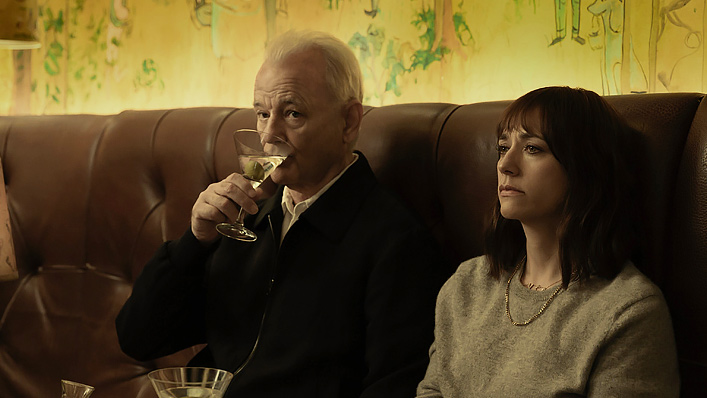On the Rocks proves Bill Murray’s charm can be too much of a good thing

Sofia Coppola’s new film On the Rocks (now in cinemas and arriving on Apple TV+ on October 23) is enjoyable. But by letting Bill Murray charm his way through every scene it turns out to have too much of a good thing, says critic Craig Mathieson.
Bill Murray, who recently turned 70-years-old, is at the national treasure stage of his career. The deadpan comic cynic, whose touch has a dry whimsy distinct among successive generations, has gone from the improv upstart who gatecrashed Saturday Night Live in 1977 to a beloved elder statesman whose mere appearance now sends a thrill of anticipation through audiences. But when you treat someone as a monument they tend to take on the characteristics of one: sturdy, fixed, inflexible.
See also
* All new streaming movies & series
* All movies now playing in cinemas
That’s not the best place for an actor to be, especially when the director who should be challenging them is instead serving as their enabler. That’s what Sofia Coppola does with her new film On the Rocks.
The film is a somewhat slight but amusing study of a woman’s struggle with anxiety. On the cusp of 40, Laura (Rashida Jones) seemingly has it all: a career as a writer with a new book commissioned, two adorable young children, a downtown Manhattan loft and a businessman husband, Dean (Marlon Wayans), who she is starting to suspect might be having an affair. Laura is embarrassed about doubting Dean, apologetically telling those close to her that “he’s such a good guy” even after his luggage post-London trip contains a surprising item.
The one person who immediately seizes on her suspicion is her father, Felix, an art world gallerist and raconteur played by Murray. “Check his text messages,” dad tells his daughter. The game, even if the rules aren’t agreed upon, is afoot.

Felix is too good to be true
First seen as the window of his chauffeured car descends, offering consolation and childhood nicknames to Laura, Felix presents as an idiosyncratic rake. Riffing with his long-time driver, rocking an immaculate outfit, offering whistling tips—he’s an old school charmer.
This is catnip to Murray, who coolly circulates through every set-up that Coppola can conjure up as Laura and Felix grow increasingly bold in their covert investigation. When the police pull the pair over in Felix’s vintage red sports car, he cons the uniformed officer by claiming to know his cop dad. Instead of a ticket the police officers give the car a push start. It’s a brazen, unearned exit; one that symbolises how Felix skates through the film, sometimes to its detriment.
Part of Felix’s concern for Laura stems from his infidelities. It becomes clear that he cheated on Laura’s mother—three generations of women in her family are briefly seen, where the mention of Felix brings nothing more than a smile and a shrug of recognition—and torpedoed his family life. There are subtle queries circulating, often unspoken, through Laura’s predicament, whether it’s the suggestion that perhaps she has exaggerated Dean’s transgressions to bring the spotlight back onto herself, or the emergence of long held recriminations about Felix’s misdeeds.
The problem is that after indulging Felix’s philosophies of philandering, which boil down to men being hardwired to pursue multiple women, the reckoning between father and daughter is so tepid. Having made Felix the epitome of the delightful Bill Murray character, Coppola can’t hold his feet to the fire.
Keeping Bill Murray in check isn’t easy
Obviously, Coppola and Murray have been here before. The filmmaker’s second feature, 2003’s Lost in Translation, helped complete the transformation of Murray from comic actor to bittersweet and eccentric dramatic lead. Also squiring a younger woman—Scarlett Johansson’s Charlotte—who is curious about her marriage around a busy metropolis, the Tokyo-set tale allowed for fractures in Murray’s character, Hollywood actor Bob Harris.
The far from home ennui that permeates Lost in Translation spoke to regret, but in On the Rocks Felix, with the exception of a blank look at a critical moment, can’t be honest about himself. Instead, when finally challenged he lashes out at Laura, only for her to quickly forgive him. The narrative is breezy and the leads riff with pleasurable ease, but the story aches for what it ultimately lacks.
As gifted as Murray is, letting him go full Bill Murray in a lead role is a mistake some directors seemingly embrace. In 2014’s St. Vincent writer and director Theodore Melfi crafted the role of Vincent MacKenna for Murray, a misanthropic Brooklyn retiree with questionable habits and a big heart who becomes the unlikely pal and guidance counsellor for a neighbour’s bullied son.
Murray’s performance played as a greatest hits compilation—Rushmore, The Life Aquatic with Steve Zissou, Zombieland—and its feel good finale carried no emotional heft. Even a filmmaker as astute as Jim Jarmusch went for a maximal Murray when casting him as a dyspeptic sheriff in his 2019 zombie outbreak comedy The Dead Don’t Die. Murray wrenched each gulch dry line into starchy shape.
Over-egging Murray’s character and performer doesn’t sink On the Rocks, but it definitely detracts from what the film gets right, whether it’s the hauntingly beautiful shots of Manhattan’s pre-coronavirus canyons at dusk, or the way Coppola encapsulates an entire marriage’s progress in two brief tracking shots: abandoned clothes on a wedding night, abandoned children’s toys years later. It has piquant observations and moments of clarity, but even for an artist as interested in detachment as Coppola is it struggles to draw a genuinely tangible revelation from Laura’s crisis.
What endures is Bill Murray—not stealing the movie, but having it handed to him.















